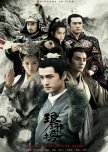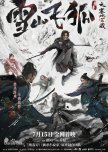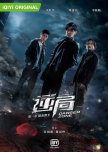
Mother most foul.
I prefer to review c-dramas that are arbitrarily split in two parts to circumvent episode caps only once, after the entire story has been told. In this case, I am making an exception because Part 1 is largely a family drama that focuses on a difficult mother daughter relationship. This Part 1 review will evaluate that aspect of the story and defer a full discussion of the romance to Part 2.Cheng Shaoshang is a grey character - a thorny, defiant, scheming and distrustful Han Dynasty fifteen year old. She is left to fend for herself while in the care of abusive but not smart relatives while her military family is away defending the country. She runs circles around them and grows up to be distrustful, cunning and unrestrained. When her parents return from the battlefront, they are appalled to discover a lovely, wild, uneducated child, shockingly unschooled in the etiquette expected of the young daughter of a newly minted marquis. Her mother, a fearless, decorated general finds in her recalcitrant daughter a greater foe than found on any battlefield. The mother daughter conflict is the guts of Part 1 and drives most of Shaoshang's actions and decisions.
As a fan of grey characters, I like Shaoshang's character design a lot and Zhao Lusi delivers a very empathetic and charismatic portrayal. While there are better actors, what makes Lusi special is she is very, very funny. Even though there is a recognizable pattern to her comedy, her timing and delivery is more refined with each drama. Underneath the humor, she shows us that Shaoshang is a sad person who refuses to weep; adroitly infusing a note of loneliness, false bravado and vulnerability. This makes the character extremely empathetic, to the fault of being overly so. Lusi seems less comfortable articulating Shaoshang's many flaws, which are glossed over hastily and in a muted tone. As a result, Yuanyi's insistence on harshly taming her daughter's "harmless mischief and high spirits" comes across as heartless and misguided. A more balanced depiction of this relationship rather than one where the mother is so unambiguously the villain would be more interesting and realistic.
One of my biggest issues with the character writing is how main characters, especially Shaoshang are elevated by diminishing other characters, particularly her mother. Their forced separation from birth and subsequent alienation and resentment deserves compassion on both sides but is written in a way that consistently only assassinates the mother's character. After suffering through many of their blood boiling disputes, I was pleased to see Shaoshang get some inkling of what her family went through after Hua City. And I thought she won her mother's grudging respect and approval in how she dealt with Lou Yao. So I was just gobsmacked and revolted by how her mother inexplicably smacks her down in front of the entire court. This is all so that Ling Buyi can gallantly come to the rescue by praising her to the skies as the best lady in the capital. Which considering how awful the other ladies in the capital are, is hardly such a great compliment. After the initial cheap thrill, it looks very high handed and coercive on Ling Buyi's part. It also undoes the hard won truce if not tentative mutual understanding between the mother and child. I don't need them to ever see eye to eye or become best friends but it is disappointing to see Shaoshang's nemesis in Part 1 reduced to a two dimensional mother most foul.
What I can praise is how Shaoshang is lifted up by her intelligence, courage, compassion and her ability to do the right thing even at great cost to herself, which we see in both the Hua City arc and Lou Yao arc. Unfortunately in the latter half, Shaoshang is propped up largely by kicking other characters down. I have never seen such a long list of repetitive, nasty and screechy female characters in a drama. They are all cardboard copies of each other - bratty, rude, stupid, arrogant and in love with Ling Buyi. The mothers are all older and uglier versions of their daughters. I don't enjoy watching women doing their worst to each other. Nor do I like that they are repeatedly dressed down by men, even when it is Ling Buyi and it is well deserved. Sure it is very satisfactory in a low way but it is also frustrating and with repetition, boring. It is very disturbing that with few exceptions (Qi Qi and third aunt), the likeable characters in this drama are all men.
Despite a few thrilling knight in shinning armor moments, the romance is only set up in Part 1 with little real development. Shaoshang's main purpose is to gain freedom and escape her mother's eagle eye and she views marriage as the means to that end. None of her suitors are that compelling and their courtship methods are so appalling they are comical. Lou Yao trails after her like a lovesick puppy, willing to wait on her hand and foot without realizing that women don't need to marry doormats or servants. Yuan Shen's retarded strategy seems to be to make her hate him and pray that hate turns into love. But Ling Buyi is the one that just takes the cake. He makes sure her parents, no, the whole kingdom, knows she has seen him nekkid and failing that, makes her an offer she can't refuse. Who ultimately prevails is pretty much a foregone conclusion with the casting of Wu Lei, which is also a bit of a shame. I'd enjoy it more if we are kept guessing for awhile and there is genuine competition among worthy suitors.
We don't get to see enough of Wu Lei or the romance as Part 1 is mostly Shaoshang's family story. However, there is enough romantic fan service that shows Wu Lei's chemistry with Lusi is promising. While Wu Lei looks incredibly hot as the cold and intimidating general Ling Buyi, initially he appears stiff, like he is trying too hard to project gravitas. He improves noticeably later on when he relaxes his face muscles and his character is humanized by his sidekicks Liang Qiuqi and Liang Qiufei or Tweedledee and Tweedledum. Tweedledum is my favorite side character; his vivid facial expressions in each of his interactions with Ling Buyi have me rolling with laughter. Indeed what really livens this drama's slow burn pace is the humor which also brilliantly amplifies character traits. It is a poignant reminder of how funny and ferocious Wu Lei's Fei Liu was. I had long forgotten how good he is at humor. I look forward to seeing more of Ling Buyi's story as well as genuine relationship development between the leads in Part 2.
If I were to rate Part 1 solely on the mother daughter relationship, I would only give this an 8.0. What makes me mad is this had a lot of potential and we really don't get that many good historical mother daughter character stories. Instead the mother is written to have so little redeeming value it just ends up being a giant waste of emotional energy. But I will throw in another 0.5 to make this 8.5 because apart from the first four episodes which were an aberration, I enjoyed the comedic moments immensely. I may have given this a 9.0 without the many nasty, noisy women.
Was this review helpful to you?

The Princess Bride.
Lost You Forever is a dark, beautiful, suspenseful and, poignant tale of intrigue, treachery and longing. This drama is immersive with its air of mystery, the shiver of danger, a whisper of regret and a sense of profound loss and longing that saturates every scene. It is a story about love but it is not a love story. It is a far more complex and expansive exposition of the many kinds of love and how it can be restraining and boundless at the same time.Set in Dahuang, a magical, treacherous and unpredictable world where humans, demons and deities co-exist, two forsaken royal orphans vow to always cherish and protect one another. Shattered by a broken promise, Xiao Yao loses herself, misplaced during a time of great turmoil. She assumes the appearance of a man and lives among the humans and demons of Qingshui Town as the village fertility doctor. This is the most exciting arc because everyone has secrets and danger lurks around every corner. When cornered, Xiao Yao is most adept at grovellng, lying or poisoning her way out of trouble. Yet she is carefree, uninhibited and almost contented in Qingshui Town with her found family. Alas, destiny catches up with her as Cang Xuan, Tushan Jing and Xiang Liu all converge upon Qingshui Town, shattering her refuge.
The latter arcs take on a political tone as Cang Xuan emerges as a contender for the Xiyan throne with Xiao Yao clearing the path for him. They must establish Cang Xuan's support base among the restless and resentful Central Plains; where the noble clans and families have complicated blood ties to remnants of the defeated Chenrong state. Xiao Yao is the princess bride, a chess piece that Cang Xuan dangles temptingly in front of the scions of the powerful aristocratic families he seeks to win over. Marriage to him is simply a means to seal alliances. He supresses his heart's deepest, secret longing by sheer willpower. Zhang Wanyi adroitly portrays Cang Xuan as a consummate politician, a very dangerous, smiling tiger / xiàomiànhǔ 笑面虎 who has his enemies in a death lock before they even know it. Love is not of paramount importance for Cang Xuan and Xiao Yao, whose destinies are interlocking as a result of their childhood oath. They work towards a greater purpose with one heart and one mind. Anyone and everyone else is always subordinated to this purpose. They are both unattainable characters who have already carved out so much of themselves for each other that there is not much left for anyone else. This is why what Xiao Yao seeks is an unequal relationship with essentially, a doormat. The princess in her however prefers that it is a doormat made of fox fur rather than a rather foolish, entitled product of too much in-breeding.
Xiao Yao is by far the darkest, most complicated, and most independent female protagonist I have come across in Chinese dramas. This is an awesome and challenging role that Yang Zi delivers magnificently. As someone who had a huge allergic reaction to her earlier works, I am speechless at her portrayal. Her Wei Xiaoliu has decisively unseated Ni Ni's Fang Weizhi as the most convincingly acted female disguised as a male character. But it is her heart-wrenching homecoming scene that can squeeze tears from a rock that truly captures the depth of Xiao Yao's sense of abandonment and despair over the person she lost forever. I can't think of another actor that has so visibly taken their acting to a high a new level the way Yang Zi has. That said, no power on this earth will make me revisit her past roles though I enthusiastically look forward to her future ones.
Tushan Jing is the weakest link in this drama both in terms of how the character is written and portrayed. Despite his stunning physical appeal, this is not a role that a promising but inexperienced actor like Deng Wei is ready for. He pulls off a charismatic and endearing Ye Shiqi that melted Wei Xiaoliu's stone-cold and lonely heart. But he lacks depth and range and visibly struggles to get into character as Tushan Jing. His perpetual stricken, deer-in-the headlight expression threw me out of some of the drama's best, most intense moments. When the Haoling King assures his daughter that the shrewd and canny Tushan Jing must have already guessed her identity, the camera pans to a dumbfounded looking Tushan Jing! I burst out laughing even though I am absolutely sure I was not supposed to. It does not help that the character's weak and indecisive waffling does not match Tushan Jing's reputation as one of the most brilliant and cunning minds of Dahuang. There is clearly also a writing issue but it does not excuse the actor's inability to make the character seem deeply conflicted rather than just weak and lacking basic smarts and survival instincts. This is a glaring weakness that weighs on both my viewing experience and my rating.
Xiang Liu is Xiao Yao's greatest nightmare, a demon that she is bonded to by a spell no one fully grasps. He is her soul mate; they are both lonely, realistic characters trapped by a cause that is bigger than themselves and thus have no free will. Tan Jianci's masterful, subtly tragic rendering of this vicious, resentful and enigmatic nine-headed demon with a shockingly passionate heart has catapulted this fantastic actor to a new level recognition. His styling is spectacular but what takes my breath away is how with the angle of the head or a flicker of an eye, his expression can change from unholy amusement to vicious cruelty; from tortured to pure, unbridled joy and affection. I don't know how Xiang Liu's story ends but the fact that he is committed to a lost cause that pits him against the person Xiao Yao protects at all costs fills me with dread. I cannot see any scenario in which this ship does not somehow sink but my heart won't listen to my head that urges me to get on the lifeboat to safety before it is too late.
Season 1 sets up the backstory of a world torn apart by war and introduces many well-written and multi-faceted characters that were collateral damage in the conflict. Intricate relationships and debts that will at some point come due accumulate between the various stakeholders. After some draggy politicking, Season 1 ends triumphantly with an unexpected twist and sets the stage very nicely for Season 2. I expect Season 2 to reveal even more secrets from the past that will force Xiao Yao to make some impossible choices. How unbreakable is her bond with Cang Xuan? Will the tragic story of Chi Chen and the Xiling witch repeat itself? Will Deng Wei finally get his act together and give us the real Tushan Jing? Will Xiao Yao shock us with her marksmanship by shooting her rival in her black heart? I hope we will not have to wait too long to find out. At the same time, I am grateful that this breaks in a good place for a time out. I have come to care too much for these characters and something tells me that this is the kind of story where even those who get what they want may not truly want what they get.
So far, Lost You Forever is the most addictive and immersive drama I have watched in 2023. I rate this a 9.0 for now because there are some notable flaws but if Season 2 comes together well, there is scope for me to revise it up.
Was this review helpful to you?

The Spy Who Loved Me.
This espionage thriller about the making of a communist spy begins in 1936, a pivotal year in modern Chinese history for both then ruling Kuomintang and the rising Communist Party of China (CPC). The look and feel of this Republican era spy drama from the muted palette to the understated characters to the way even action scenes are shot is markedly different from its flamboyant, glamorous and absurdly bullet proof peer, The Disguiser. What I like about The Rebel is the realistic portrayal of spies who are much more like George Smiley than James Bond. None of the main characters have deep political or ideological convictions beyond a burning desire to expel the occupying Japanese forces from China, thus their allegiances and motives are easy to understand and relate to. The dumbing down of the competing ideologies and political factions of the day however gives the overall impression of a lack of substance that is at odds with how seriously this drama takes itself. And that is my biggest gripe: yes, those were chaotic, stressful and dark times and spying is a serious business but does it have to be so completely and utterly lacking in wit and humor?The drama opens in a thrilling and suspenseful way with the arrest of a CPC operative by Chen Moqun, the head of the Shanghai district of the Fuxing Club, which is the Kuomintang's secret service. Together with his young protege Lin Nansheng, they use psychological warfare to turn him and use him to try to weed out the Mailman, a long hidden spy in their midst. Thus begins a chilling, suspenseful cat and mouse between two equally matched spymasters trying to out manoeuvre one another. This was by far the best arc of the drama, anchored by masterful performances by both Wang Yang (Chen Moqun) and Wang Zhiwen (Gu Shenyan). This is one of those rare dramas where the villains steal the show and on many levels they are more cunning, more ruthless and more capable than the protagonists. Chen Moqun is by far the, best most interesting character and the only one that is written with some humor - a complete sociopath, terrifyingly intelligent, flamboyant, suspicious, foolishly blinded by Lin Nansheng's competence, a surprisingly reluctant traitor and a wild party animal! Both lead actors are completely upstaged by the veteran actors for most of the drama.
I am a huge fan of Zhu Yilong and it is clear from how gaunt he looks and from the intensity of his acting that he really poured himself into this role. And he is a terrific actor so it is not to say that the role is not well acted, there are some really good moments. But overall Zhu Yilong delivers a cautious interpretation of the character and one that is not noticeably differentiated from his past roles. He has the most incredible, expressive eyes that together with the tiniest facial muscle movements, can convey an incredible range of emotions and in this case, way too many emotions. Zhu Yilong's interpretation of the character is more fitting for someone who accidentally and reluctantly becomes a spy but Lin Nansheng is a young man that voluntarily joins the spy academy and graduates practically at the top of his class - he should be more cold hearted and have a better poker face to begin with. As much as I appreciate seeing how events and relationships reshape his values and ideals over time into burning conviction, it is better to have to occasionally guess at his emotions rather than to see everything written all over his face. It is telling that later in the drama when he matures into a colder more inscrutable spy, they cover his eyes with tinted glasses to stop them from spewing his guts. His journey is portrayed as very lonely and intensely introspective; so much so that he doesn't seem to connect with most of the main characters. Thus when he mourns their loss, it doesn't always resonate.
Zhu Yizhen starts out as an archetypal character for this genre - a passionate young student CPC member that is perplexingly inspired by Leaves of Green, Walt Whitman's greatest, heavily democratic works. I don't mind the spy who loved me trope so I was really looking forward to watching her turn Lin Nansheng, recruit him and them work together as a kick ass spy team. But unfortunately it doesn't quite play out that way and she doesn't become the strong female lead character I was looking for. She remains pretty much a passionate, reckless amateur and damsel in distress that needs saving all the time. As much as I like that all of the CPC spies are written to be very fallible in the vein of John LeCarre's spies, she really takes the cake in terms of incompetence. What I find most unbelievable is she falls for the same grift twice! The only mission she manages to complete successfully is the final one. Tong Yao's portrayal of this character is textbook but bland and forgettable and her frequent blank stare with lips slightly parted gets really old very quickly. There is no spark between her and Lin Nansheng so I never bought into their rather pedestrian love story. Lin Nansheng's relationship with Lan Xinjie is deeper, far more complex, better developed from many dangerous missions and much more moving.
The first arc of this drama is everything you want a spy thriller to be. Each progressive arc is less good and they don't transition that well, leaving a feeling of anti-climax. The latter half becomes noticeably less tightly written and loses suspenseful intensity. Characters start popping up out of the blue from nowhere whenever someone needs to be rescued. Lin Nansheng's classmate has a particular knack for showing up at the right place at the right time. In order to advance the plot, many of the most important characters get dumbed down to be rather cursorily written off to make way for Lin Nansheng to step up. I didn't like how some of the best most interesting power dynamics between Chen Moqun, Gu Shenyan and Wang Shian fizzle out without coming to a climax, a moment of truth and closure. Thus when Lin Nansheng comes of age, he isn't even going up against truly worthy opponents and there is no psychological thrill. The last arc is the weakest, it is too long of a time jump, deviates into patriotic tropes, gratuitous sacrifices, leaves open threads and like most of the arcs, comes to an anti-climatic and very predictable end.
If I have to rate just the first arc of this drama, it is at least an 8.5 or a 9.0. Unfortunately the storytelling doesn't hold up and the second half is at best a 7.5-8.0. I really dislike dramas that fade at the back half so I rate this at 8.0-8.5. I would also note that I have read and watched a lot of amazing spy thrillers so I tend to be tougher on this genre.
Was this review helpful to you?

Hope is not a strategy.
The Hope is the Chinese adaptation of a Japanese manga Dragon Zakura about an unconventional teacher who takes on a class of underachieving students. While I haven't watched the Japanese television version, this Chinese adaptation has clearly been heavily localized even though it retains a manga-like flavor in certain characterizations and comedic sequences. This drama critically examines the Chinese education system and its strong emphasis on the all-important Gāokǎo/高考 nationwide college entrance exam which takes 9 hours over two or three days. In a nation of largely single-child families, nothing is more important than getting their only child into the college of their dreams. With over 10mm taking the Gāokǎo each year, the competition is intense. Even though the pass rate is very high (85-90 percent), a minimum score of 600 (out of 750) is needed to gain acceptance to the most elite universities. Less than 7pct of students are accepted at these top universities and the acceptance rate at Qingbei (Tsinghua University and Peking University) where the crème de la crème matriculate is less than 0.1pct.After a series of entrepreneurial setbacks, star lecturer Lei Ming returns to teaching. He teams up with Sang Xia, a psychology teacher on an experimental program to turn around students that are not living up to their potential. His handpicks five students for his experimental Class 11; an orphan Li Ran, a math whizz Cheng Yushan, an aspiring rapper Jiang Qinglang, gossip girl Bian Xiaoxiao and the browbeaten Yu Yang. With Gāokǎo just a year away, his lofty boast of getting all five of them into Qingbei is widely ridiculed. His biggest skeptics are the students themselves and Sang Xia. His methods though unconventional are hardly trailblazing; much of it involves tried and tested methods used by successful students including time management, minimising distractions, identifying focus areas and being tactical about selecting courses. The drama makes it clear that hope is not a strategy and that while there are smarter, better ways to study, there is just no way around putting in the hours.
This is an exceptional drama that makes a poignant and compassionate case for students who have fallen behind. It exposes how they are failed by an indifferent sink or swim kind of education system. Each of the young actors does a fantastic job portraying their hardships, self-doubt and how they discover their best selves in their struggle against overwhelming odds. I don't have a favorite among them because they all have their own special talents, their own crosses to bear and blossom in their own ways as they learn to take ownership over their own destines rather than just being victims of circumstances they can only change at the margin. Lei Ming and Sang Xia are like fairy god parents who can help but can't make their lives perfect. Rather, they impart upon them the invaluable gift of learning how to cope and the ability to feel compassion for others. This is seen in how the understanding they show poor little rich boy Shen Yao and Lei Ming himself when he lets them down. In saving them, in many ways Lei Ming saves himself.
As for Zhang Ruoyun, he once again shows his uncanny ability to pick fantastic scripts. As always, he leaves so much runway for his young co-stars to shine and lets this story really be about them without defaulting into simply being a plot device. Because his Lei Ming is far from perfect; he is cynical and beneath his confident facade, deeply damaged by his resentment of his father, the great teacher Lei. In helping Class 11 in their struggles with Gāokǎo and their personal devils, he gains perspective on his own journey many years ago and gains some understanding of his father. My heart was in my throat watching Zhang Ruoyun portraying this role so movingly in light of his own difficult relationship with his father. Probably largely due to Zhang Ruoyun's powerful charisma, I found Sang Xia's constant baiting and argumentativeness to be pompous and super annoying initially. But she grew on me and I came to appreciate how their relationship actually thrives on calling each other out and challenging each other to do better.
This drama for all intents and purposes ends at episode 29 and it is fine to just stop there. The episode 30 "twelve years later" epilogue replaces the young actors with older vague lookalikes. That broke my connection with the young actors that I grew to love so much. I didn't mind the sober tone of the epilogue. It delivers the right message that there are no absolutes in life; that even Qingbei is no guarantee that all's well that ends well. The biggest lesson learned, the one that stands the test of time beyond all the academics is about coping with life's ups and downs. And they are still young enough that the whole world still lies ahead of them so their journey continues. My biggest issue with it is I had hoped for better for Lei Ming. But I guess that is what makes this drama so special; this ability of to be so incredibly inspiring yet so unbearably realistic at the same time. If you wish to skip the realism, then call it a day at episode 29. It still falls short of a fairytale but at least there is an abundance of hope.
This is a highly recommended and very memorable watch that I enthusiastically rate 8.5/10.0.
Was this review helpful to you?

Good enough.
This is a comedy will make you cry as hard as it will make you laugh. It is a very personal, very moving tribute of comedian, actress, screenwriter and first time director Jia Ling to her mom, Li Huanying - factory worker, volleyball player and first person in Xiangyang to own a TV.I tried to watch this shortly after its release but dropped it within ten minutes because I was put off by the fact that Jia Ling chose to play herself, the then 18-year old Jia Xiaoling. In her late 30s at the time, she just doesn't look the part of a teenager so I abandoned it before I realised that nonetheless, she feels the part because she IS the part; every emotion is heartfelt down to the tiniest nuance. And of course she is who she is today because she is a funny lady, very, very funny with excellent comedic timing. Nonetheless, the criticism that the main role is possibly mis-cast is a valid one. There are some rough edges to the overall production that are very acceptable considering this is her directorial debut.
The main premise is simple, based on universally relatable mother daughter themes. Like many, I can vividly remember being 18, feeling awkward, unaccomplished, insecure and possibly a factory production run error of my lovely and vivacious mother. We have all been Jia Xiaoling, wanting to make our mom's proud, longing desperately to be worthy while dead set certain we are not. A freak of nature transports Xiaoling back to the past, where she meets and befriends her young mom and has a chance to be a part of all the most important events in her life. She hilariously and movingly tries to change her life for the better even if it means her mom ends up with someone else to hopefully have a more worthy daughter.. And in the process she movingly comes to the realisation that she was always already good enough. These are tried and true mother daughter themes that may seem to have been beaten to death but Hi Mom still manages to articulate a fresh, creative take and deliver a moving, heartfelt twist to this tale as old as time.
This is not perfect but I can happily give it a 9.0 and call it a masterpiece because it is an unforgettable movie that will make you call your mom or hug her if you are lucky enough to be next to her. After all, this humble, low budget production is only the highest-grossing movie of 2021, the second highest-grossing non-English film of all time, and the highest-grossing film by a solo female director. If like me, you haven't seen your mom for over a year due to covid, you may want to wait to watch this. But you must definitely watch it.
Was this review helpful to you?

Junk food with no calories: highly addictive and binge-worthy.
This is THE drama that revived my love for Chinese costume drama. I was hopelessly addicted and inconsolable after it ended. I hungered for the next Ten Miles of Peach Blossoms and was crushed and then frustrated when I realized there is nothing else like it. I still have to restrain myself from binge re-watching my favorite parts. My conscience always struggles with inflicting this on someone else so be warned: TMOPB will connect with you and compel you to fall in love with it but it will also ruin everything else you for a long time.At its heart, this drama very simply an intense, fantasy love fairy tale that spans three lives and three worlds. The plot is not complex, the CGI and some of the fight scenes are not the best and there are small holes and loose threads but nothing diminishes the utterly spell-blinding love story between Bai Qian (Yang Mi) and Ye Hua (Mark Chao).
In the first part of the story, Bai Qian is disguised as a boy Si Yin, the best loved disciple of Mo Yuan (also Mark Chao), the God of War. The young Bai Qian/Si Yin is a carefree, mischievous and indifferent student. A terrible betrayal by her first love that leads to a devastating war and the sacrifice of her beloved sifu Mo Yuan’s soul leaves Si Yin inconsolable with grief and remorse. If Bai Qian occasionally comes across as dislike-able, it is because Yang Mi did not successfully convey how deeply and utterly wounded Si Yin/Bai Qian was by these events. This transformed her into an aloof, cynical and outwardly cold goddess who closely guards her innately warm and loyal heart.
As for the Ye Hua character, part of his magic is there is no such thing as a Ye Hua - he is the brilliant, invincible and handsome Crown Prince of the powerful Celestial Tribe. He is also a great cook, a wonderful father and he loves only once and unconditionally. But underneath that too good to be true surface, he has his own glaring flaws. His first hopeless love is Susu, a lonely, kind heart-ed, docile mortal woman he meets on a chance encounter. It is an unequal relationship that was doomed to end in tears. As a result of his inexperience and hubris, he makes many miscalculations and ultimately betrays her in a way that tragically ends their relationship. He mourns her and waits for her return for hundreds of years and against all logic and odds. When he discovers Susu and Bai Qian are one and the same, he is elated and goes to extreme lengths to crack the ice around her heart and win her love and forgiveness. But Bai Qian is a much older and complicated woman who is initially dismissive of his puppy love. She is a high goddess and a queen and thus more than his equal. While he was thrilled by this spicier version of Susu, he finds to his frustration and fear that she has a past and her heart is not as easily won.
Mark Chao’s Ye Hua will forever be the defining Ye Hua. It doesn’t hurt that this dude has the best eye ogling motion and is capable of the most unbelievable micro facial expressions. He is not afraid to look ugly when he is terrified or devastated with grief. As Susu’s Ye Hua, he is the austere young prince who discovers love and happiness for the first time. As Bai Qian’s Ye Hua he is darker, more passionate, more aggressive and much wiser. Chao's Ye Hua literally gets better looking as the drama advances. Its an illusion that arises as he compels you with the many faces of Ye Hua; the serious and dutiful prince, the valiant warrior, the besotted bridegroom,the grieving widower, the protective father, the frustrated lover... He is equally persuasive as the stoic Mo Yuan who silently mourns the love he lost while he was recovering from saving the world.
Yang Mi and Mark Chao together are a heady, addictive combination. They are both so gorgeous that it is just a gigantic eye candy feast. This drama unabashedly spams you with steamy scenes of the two of them kissing and rolling around in bed. I suspect Mark Chao was cast as Ye Hua based solely on how shockingly good he looks lying down and his terrific acting skills were just an accidental happy bonus. Their chemistry gets noticeably more intense and you to fall in love with them falling in love. In lighter moments, the dialogue is both hilarious and touching. As a couple they subtly mock many cliche costume drama stereotypes – Ye Hua is the cook, he is Mr Mom, he cross dresses and he turns on the waterworks more easily. She is a much older woman who can drink him under the table, proposes to him and likes to lecture him. While the drama is sloppy elsewhere, Ye Hua and Bai Qian’s scenes are shot with meticulous, loving attention to detail. In each life, they hold each other the same but slightly different way when they sleep, she combs his hair the same but slightly less loving way, and when Bai Qian hugs Ye Hua the way Susu hugged him you just KNOW he has almost wormed his way back into her heart.
All of the emotionally moving scenes are accompanied by one of the four haunting love songs from the OST. The production team had a cheeky sense of humor when it came to Ye Hua’s costumes - they sneaked in a number of really sidesplitting outfits. In the memorable episode when he meets Bai Qian for the first time, he looks like Big Bird in a black feather outfit that highlights his beaky side profile in not the best way. By then, I was so smitten that the thinking part of my brain barely processes this. And then there is the cross dressing.… In most of the love scenes, Ye Hua borrowed my pajamas and copied my hairstyle. I can't explain how I am not bothered that he had the audacity to look so delicious in my nightgown. At the end he even pulls off this black with pink peach blossom flower print dress that I have aptly named Su Jin’s Revenge. None of it matters - he can speak the cheesiest lines, cry, cross dress and still come across as this crazily sexy, hot man beast. Love is blind indeed.
The strong cast of supporting characters brings this story to life - the uncle confidante, the brother and his "friend", the deranged evil concubine and the usual love rivals. There is also Dijun (Vengo Gao) and Feng Jiu's (Dilraba Dilmurat) love story which has charming and heartbreaking moments but the main couple is a tough act to follow.
I will leave to your own imagination the many hidden undertones to this show - from the somewhat taboo to the very naughty. There are many better, more well-rounded shows with more substantive and complex plots out there. This one still wins on the strength of its simple, brilliantly accomplished mission: it forces you to relive all of the joy, passion and pain of an intense love. Like junk food, it appeals to all of your most basic instincts and can result in binge-ing. Don’t ask why - just enjoy it. Over and over and over again if you must.
There are about 60 episodes of very funny bloopers on Youtube on the Croton Mega Hit channel but most of them are not translated.
Footnote: Forget the rubbish Netflix title Eternal Love, this drama is Ten Miles of Peach Blossoms.
Was this review helpful to you?

The king maker is king of kings.
Note: There are some statements of well known. historical facts in this review. They are by definition not spoilers but be warned in case you are unfamiliar with the history of this period.Sima Yi, courtesy name Zhongda. History's most cunning grifter, a man who stole a throne and an empire more than once! I always enjoy dramas like this because they bring larger than life historical characters to life and deflate them into close to normal human beings. I never imagined Sima Yi would be portrayed as such a timid, groveling, deceptively harmless and well, just ordinary fellow. Or that he would be so terrified of his wife. That just cracked me up. Audacious.... sacrilegious even.... love it!
The drama opens with Zhongda, a brilliant scholar and tactician, welcoming his firstborn son Sima Shi into the world. His father Sima Fang is a shrewd and influential minister of the Han Imperial Court. By then, warlord Cao Cao had already openly seized power and repeatedly bullies the Han Emperor into a sniveling, terrified puppet. Zhongda unwittingly catches the eye of Cao Cao as he deftly extricates his father from a dire situation. He goes to extreme lengths to avoid serving Cao Cao who is both keen to make use of his talent and wary of it at the same time. Recognizing his innate cunning and ambition, Cao Cao regards him suspiciously as a double edged sword and comes close to killing him dead many times.
Initially I was surprised and a little bit underwhelmed to see such a timid and groveling Sima Yi. But the layers peel away very satisfactorily to reveal his hidden ruthless nature, his scheming and bold ambition. He is a king maker, someone capable of securing the throne for Cao Pi, the less favored son against Cao Cao's own wishes. He then proceeds to steal an empire for Cao Pi but this part seems whitewashed. I doubt Liu Xie was really that eager to so simply hand over the throne. Not surprisingly, he also intervenes in Cao Pi's succession plans. At that point, it is clear that Sima Yi the king maker is king of kings; that three generations of Cao rulers' succession is determined by this man. Notwithstanding his many contributions, Sima Yi is portrayed as a selfish and cunning character who parleys his own interests ruthlessly. He manipulates two revered ministers into sacrificing themselves to ensure Cao Pi's ascension, but it is clear his primary motive is to save his brother's life.
Sima Yi's great rivalry with Yang Xiu is rivetingly played out in the bitter succession battle between Cao Pi the worthy son and Cao Zhi the favored son. Both are ambitious and brilliant tacticians but they couldn't be more different in nature. Yang Xiu is arrogant, outspoken and extremely intuitive. He cannot help showing off, often over estimating himself and underestimating his enemies. This cost him his life and Cao Zhi the throne his father so badly wanted to give him. In sharp contrast, Sima Yi avoids attention and while he is is often underestimated, he has a healthy respect for his enemies capabilities. His final conversation with Yang Xiu, someone he empathized with, respected and learned from as a worthy opponent illuminates how Sima Yi managed to hang on to his head through many dangers. I have not watched Wu Xiubo before and I was hesitant about him as he is not the image that jumps to mind when I imagine Sima Yi. My concerns faded almost immediately and I cannot think of a better actor to play the role of Sima Yi as characterised by this production.
This drama largely sticks to history in terms of the key events and leading characters of the day. Told chronologically, the drama unavoidably peaks with the exit of the veteran actors who also play the most interesting figures of the day. This drama's highlight for me was Xun Yu's (played by none other than the fabulous Wang Jin Song) opposition to Cao Cao's decision to form his own feudal state. Their bittersweet final exchange that touched upon their long friendship, mutual respect and alignment that turned into reproach and disappointment is a powerful, memorable and compellingly acted drama moment that only two actors of such caliber can deliver. I can recommend watching this drama for that scene alone. I feel pity for anyone attempting the role of Cao Cao after Yu Hewei. I almost wept with joy at the perfection of his rendering of Cao Cao in his twilight years; the ambitious warlord stymied by the limits of his own mortality and torn by his succession dilemma between his most worthy son and his most loved son. Needless to say he is as bad a dad as he was as good a warlord and statesman. Ironically, Cao Cao sows the seeds of the downfall of his own empire as Cao Pi is also a terrible father who also messes up his own heir. Whereas the Sima family in sharp contrast are paragons of Confucian family virtue, the foundation of a moral society.
When it comes to the inner palace and familial relationships, the storytelling embellishes wild history and heavily fictionalizes the historically insignificant aspects. I was sad but unsurprised to see Cao Pi's deep friendship with Zhongda become distrustful and utilitarian after he becomes emperor. While I understand the audience appeal, it is well known that Zhongda's relationship with his wife was much less cordial but I love Liu Tao and was happy to buy into this Disney version. However the whole song and dance with Lady Bai and how Zhongda was "forced" to accept her went too far and just made me roll my eyes. I expect a man of that status in those times to have concubines I don't see the need to waste so much time suggesting he meant to be monogamous when he definitely was not. I also was not compelled by the chemistry between Cao Pi and Lady Guo but at least they didn't try to suggest he didn't have a harem. Lady Zhen's story could well just be speculative history but she is the character I felt the most sorry for in this drama.
The Advisors Alliance is the first instalment of Sima Yi's story and ends with Sima Yi retiring from active duty under Cao Pi. By then, Sima Yi and his proteges had succeeded in pushing through agricultural and structural reforms that made Cao Wei great and restrained the power of the Cao clan warlords. It is a fascinating account of how an understated and often under estimated Sima Yi was ruler in deed if not in name. His machinations paved the way for the Sima clan's rise in influence which eventually led to the founding of the Jin dynasty, which many still argue was not a legitimate state. I enjoyed this enough to rate it an 8.5 and will probably go on to watch the second season Growling Tiger, Roaring Dragon which focuses on his rivalry with Zhuge Liang.
Was this review helpful to you?

The Dark Path.
Day Breaker is a chilling undercover narcotics cop thriller that is part of iQiyi's 2022 Light On Series lineup. The drama is set in the fictional Hua City in a lawless Southeast Asian nation that bears an uncanny resemblance to Thailand. In this made-up world, the country is overrun by drug cartels and the police force is under resourced and susceptible to corruption. This drama has won high praise but it is one that must be watched with eyeballs glued to the screen due to the intense and elaborate plot with myriad twists and mind benders.Luo Xiang is an undercover narcotics cop pretending to be a mole in a local drug cartel. A planned takedown of a major drug deal goes horribly awry, apparently killing Luo Xiang. He re-emerges five years later as Chen Mo, a taxi driver who is tasked by Liao Yongjia to assume the identity Luo Xiang and reunite with the cartel. Li Yifeng really impresses in this role as someone juggling multiple identities while walking on the edge of discovery. His Luo Xiang has lived a lie as Chen Mo for so long that it is not clear he knows what his reality is, much less his former lover Su Qingzhu or his violent, jacked up cartel brother Longge. Luo Xiang's fascinating and oddly genuine bromance with Longge recalls Li Yifeng's iconic and manipulative performance as double agent Chen Shen in Sparrow. One of my biggest disappointments with Day Breaker is how this relationship was cheated of a satisfying denouement. While not a romance, the subtle longing and painful chemistry of the unspoken behind Luo Xiang's lies in his interactions with Su Qingzhu adds another layer to Li Yifeng's outstanding portrayal. Unfortunately this is another less than great role for Song Yi as Su Qingzhu is another character that is short changed at the end.
Both Feng Delun and Gong Haibin put in highly praiseworthy performances as Liao Yongjia and Yu Shenghai, Chen Mo's handlers in the undercover operation. In a cartel infested place like Hua City, everyone has a price and is forced to walk down the dark path, it is just a matter of to what degree. Thus as Chen Mo watches them wondering if either or both of them were moles that sold out Luo Xiang years ago, they are also testing Chen Mo to see if he is really Luo Xiang. The interplay between these three core characters as their stressors and motivators are revealed is the best, most intense part of the drama. While all three characters delivered riveting performances, it is Gong Haibin's Yu Shenghai that surprised and moved me the most and made me experience everything from rage to pity.
They are too many rival cartels in this drama and too many drug lords. Only two of them - Longge and Song Cai are multi-faceted and interesting. Longge is the ultimate outrageous fictional character, gruesomely and unnervingly violent and bizarrely comical at the same time. His wild affection for and trust in Luo Xiang clouds his survival instincts and innate shrewdness. There is an unpredictability in each of his outbursts that had my heart in my throat many times. Song Cai is also a complex cold blooded killer with his own code of conduct and many moments where his sentimentality and humanity pokes through. Both are too cursorily dealt with and sidelined in favour of less interesting villains.
While A-Xi is adorable and has some really funny scenes with Chen Mo, they were too few and far between. In general, humor is not well used to diffuse the tension in this overly convoluted plot. The drama could have ended at a climax at the end of Yu Shenghai's arc. Instead, the final two episodes rush through a contrived flash bang ending that relies on poorly fleshed out final villains, unnecessary twists and shocking but unworthy outcomes for good, smart characters. While it doesn't completely ruin the drama, this plot demands too much attention for it to sag like this at the end. Thus I must reduce my overall rating from 8.5 to 8.0 but I can still highly recommend it to fans of this genre.
Was this review helpful to you?

Catch me if you can!
Thirteen Years of Dust is the best Light On/Mist Theatre suspense thriller iQiyi has released since The Bad Kids and The Long Night in 2020. This tightly written mystery cum police procedural is gripping from the start. An eerily staged crime scene reminds Lu Xingzhi of a serial killer that had terrorised Nandu thirteen years ago, when he was just a rookie detective. Starting with his mentor Wei Zhengrong, he gets the old investigative team that had profiled and hunted the killer back together again. They have unfinished business to get down to. Thus begins a thrilling chase for the long hidden killer who seems to be taunting them, "Catch me if you can!"The way the narrative unfolds in parallel between the present and the past is mesmerising and immediately made me invested in the main characters, including potential antagonists. In the present, the characters are older yet wear unmistakeable vestiges of the past that make them seem still touchingly familiar. We see what they were like juxtaposed against what they have become. This invokes a haunting sense of nostalgia over what was lost and what could have been. This captures the essence of what made CBS's Cold Case one of my favorite police procedural series. Wei Zhengrong seems the most markedly affected. In sharp contrast to the rather rough, dismissive, and bitingly cynical cop in his prime, he becomes a muted, wiser and oddly broken shadow of his former self. Lu Xingzhi on the other hand has delivered on his early promise and come into his own but his family life is disrupted.
Chen Jianbin and Chen Xiao anchor the stellar cast in this production. Both are charismatic and convincing actors with such incredible chemistry that it evolves to reflect the passage of time. They each subtly take on some of the other's traits thirteen years later, indicating how deeply they influenced one another. It is not easy to play characters that have aged and changed over thirteen years, yet remain essentially that character. Beyond both leads, every main character in each of the many cases delivers riveting portrayals of both their younger and older selves. This brought the victims to life through the eyes of people who knew them, loved them, feared them, envied them and may very well have killed them! The side story that moved me most was that of the gangster and the dancer.
The plot is very well designed and is a lot more whodunit than howdunit. It is set in a time when use of forensic technology was nascent and primitive. So the cases had to be approached the good old fashioned way of narrowing down suspects to who had motive, means and opportunity. The evidence and clues are all presented in an even handed manner; there is no attempt to hide anything from the viewer. From early on, the audience has enough clues to credibly build a case around at least two suspects at any given time. While the solution is not a huge surprise as the killer is well concealed but far from invisible, it still comes with a decent twist. It is a surprisingly dark story with a chilling ending for a c-drama. The production maintains an unsettling tension of a disturbing and menacing presence throughout. If I have to criticise, the staged crime scenes are a bit pretentious and the explanation of the painting and its significance is on the weak side although it just passes muster.
Overall, this is a well written and nicely executed crime thriller that will satisfy exacting crime buffs. A highly recommended watch that I rate 8.5/10.0.
Was this review helpful to you?

Who Am I?
Sakra is an overly ambitious attempt to adapt Qiao Feng's arc from Demi-Gods and Semi-Devils (天龙八部), my favorite Jin Yong novel. This is a tall task and inevitably has resulted in an overly condensed adaptation that misses the spirit of the original works. It is carried by the fact that it is such a beloved story that most viewers can fill in the gaps.Qiao Feng, the magnetic chief of the Beggar Sect is accused of dastardly crimes and outed as being of Khitan descent at a time of conflict between Song and Liao (Khitan). He is evicted from his sect and the entire wulin (martial world) turns against him. As he seeks to clear his name, he encounters Ahzu, a minion in the powerful Murong household. He risks his life to save hers and discovers that like himself, she is also on a Who Am I? quest to figure out her origins. The narrative takes on too much between the rushed and unconvincing romance, solving murders and disentangling both their back stories. The ending is confusing with hurried character introductions to pave the way for a sequel that deals with the mastermind reveal and final arcs of Qiao Feng's story. This hurried rendition makes Qiao Feng little more than a one dimensional, lean mean fighting machine. It is a pity because Qiao Feng is Jin Yong's most powerful, complex and misunderstood male character.
Qiao Feng is the ultimate master of Jin Yong's epic 18 Dragons Subduing Palm martial arts technique, which employs inner energy and is used in most of Qiao Feng's fight scenes. The action scenes are almost ridiculously bombastic - Qiao Feng pulverising an entire horde of martial arts with his amazing energy blasts; gravity defying roof leaping and up close and lethal hand-to-hand combat or swordplay. Qiao Feng's showdown with the entire wulin is the most thrilling action sequence but it comes a bit too early in the movie. It is both incredulous and stupendous to see one man take on so many. I truly feared for Qiao Feng's life but what was more terrifying was the hypocrisy and cowardice of wulin. They basically cancelled a brother-in-arms who stared down death alongside them multiple times and ganged-up on him to try to kill him! I didn't enjoy the final fight scene as much - while splendidly choreographed and thrilling, it veered too far into the territory of wildly exaggerated almost superpower like flying leaps and from a distance qi energy strikes.
I watched the Cantonese dubbed version because to me, Qiao Feng will always be Kiu Fung and Jin Yong's famous lines always sound so diminished and lacking in vehemence and intensity in Mandarin. I think this is a great watch for the action scenes alone. I rate it 7/10.
Was this review helpful to you?

This is like a fine dining experience - to be savored and remembered. It deserves an 11/10.
Nirvana in Fire is an exceptional drama by any and all standards - nothing else I have watched comes even close to surpassing it. It truly checks all of the boxes in terms of a complex plot, an incredibly talented cast, excellent screenplay, well executed action scenes and overall movie-like visual impact and production quality.This is the story of Lin Shu's single minded quest for justice and reform. His father, a powerful general in command of the 70,000 strong Chiyan army is framed as a traitor while away defending the Liang state. Victorious but battle worn, he is slaughtered along with his entire army before they have a chance to return to the capital. Young Lin Shu barely survives and re-emerges 12 years later as Mei Changsu, the mysterious leader of the powerful pugilist Jiangzuo Alliance. His appearance is completely altered and he is a sickly, shadow of the vigorous young warrior he used to be. He returns to the capital amidst a power struggle between the crown prince and his brother Prince Yu as the Divine Talent, a brilliant strategist regarded as an emperor maker. He plays them against each other and is on surface allied with Prince Yu while he surreptitiously advances the out of favor Prince Jing. The complexity in the plot arises in the brilliant and occasionally cruel strategies he employs to uncover the full extent of the conspiracy and all those complicit in his family's murder as well as to advance Prince Jing's position. This is not a story about revenge, it is about justice. It is also about reform as justice is worthless without reform. Making abiding changes to the court and the system that would be overseen by a just and moral ruler was an equally important outcome to Lin Shu/Mei Changsu. To achieve his mission, he had to do many things he considered despicable. Cleaning out the corruption in the court was the only thing he could do to make the senseless massacre of his family and comrades in arms mean something.
This is an impossible show to binge watch - I can at best get through two episodes in one sitting. We learn from the get go that Lin Shu is living on borrowed time. That imbues the drama with an omnipresent sense of sorrow and inevitability that grows as it steadily progresses towards the end. Whenever the mood gets unbearably heavy, there are welcome moments of brilliantly timed comic relief. The first episode is probably the most difficult to follow as most of the key characters are introduced all at once .Thankfully there are many excellent character guides online that are super helpful in the beginning. There are no unnecessary characters in this show; each one was brilliantly cast and has an important role in the unfolding storyline.
The role of Lin Shu/Mei Changsu is a complex one and not at all easy to play. This was without a doubt Hu Ge's defining role and he just killed it. Time and again he was able to subtly convey a multitude of intense emotions behind a superficially stoic expression. As Mei Changsu the strategist, he was brilliant, ruthless, calculating, Machiavelli and breathtakingly cruel when necessary while battling his self-loathing for the person he was forced to become. He is filled with longing, regret and fear of discovery as he re-encounters his former love, friends and relatives under this new identity. He masterfully portrays a callous indifference that masks unbearable hurt as his actions and morals are misunderstood by his best loved friend. As they inevitably begin to recognize his old mannerisms and think the unthinkable, he cannot help but tease them with the truth before skillfully evading their suspicions. The chemistry between Lin Shu/Mei Changsu and the rest of the cast and in particular Prince Jing (Wang Kai) is mesmerizing. Twelve years later Prince Jing still misses Lin Shu, his boyhood friend and cousin and was never quite convinced the Lin family could be guilty of treason. Despite his contempt for Mei Changsu's lack of moral scruple, the principled Prince Jing's soul knows him and he is eventually drawn into a strong and touching bromance with him . Equally moving were the rare smiles, flashes of humor and fatherly affection that emerges when Lin Shu/Mei Changsu teases Fei Liu, his lethally skilled and fiercely loyal boy protector. Despite his crushing physical weakness, he desperately lies to shield his loved ones from the extent of his suffering and true condition. I found myself grieving for not only the lost friendships and love affair that could have been but for the Lin Shu that Mei Changsu can never become again.
The character development in this drama is so sophisticated and multi-layered that even the worst villains of the piece are to evoke a sense of pity for their human failings and have some redeeming aspects. The story builds towards an epic climax that sees Lin Shu/Mei Changsu confront the person ultimately responsible for this terrible and unforgiveable betrayal. Both actors in this final showdown were phenomenal but I think the tyrant's rant from rage,to hubris, to denial, to defeat , to defiance and then finally to almost but not quite remorse truly blew me away. It is in this encounter that Lin Shu delivers his most excoriating, most tragic and and most damning indictment -"If you knew your son you would never believe he could betray you. If your son knew you, he would not have refused to believe you betrayed him." The script writing is powerful and we are treated to many emotionallly loaded lines but for me, this one was the one that summed up the root of the tragedy and made me weep for both of them. But Lin Shu/Mei Changsu was beyond tears. It is this ability to convey bottomless sorrow without shedding a tear that made this Hu Ge's unparalleled performance.
{Warning - Spoiler ahead]
I love it that this show pretty much ends after the climatic peak with most of the loose ends tied up well ahead. Even though we know from the very beginning that Lin Shu/Mei Changsu dies, it still broke my heart. Nonetheless, the drama comes to a very fitting and satisfying end. While this was an enthralling, immersive journey from start to finish, I think I need to take a break with something less intense. I suspect this will remain the very best drama I have ever seen for a long time although I still love Ten Miles of Peach Blossoms best.
Was this review helpful to you?

Hiding in plain sight.
A group of eight wicked villains converge on a gorgeous, dangerous snow capped mountain in a race to recover a long lost hidden treasure they have schemed and murdered for. The almost mythical hidden fox is said to guard the treasure. Young disciples Gui Yi and Qing Wen find danger and intrigue around every corner. In addition to this shadowy hidden nemesis, they find themselves pitted against their masters and even each other.I wouldn't call The Hidden Fox an adaptation of Jin Yong's "Fox Volant of the Snowy Mountain" (雪山飞狐). It is more like wickedly good fan fiction inspired by the original wuxia masterpiece. This has resulted in very polarising reactions to this movie. Critics lament the loss of the spirit of chivalry and that the complex conflict between the main opponents is dumbed down just another revenge story. I am a huge fan of the original work that is defined by the sheer perfection in the way the story ends at the absolute peak of emotions and suspense. To me, it is Jin Yong's most brilliant and unforgettable ending. At the same time, the after openly invites invites speculation and innovation. That is what the writer intended. This production takes up that challenge and while it falls short of exceeding the original masterpiece, the storytelling is still very, very good. It is very suspenseful, action packed and thrilling with a few dazzling twists that delivers an innovative and cohesive alternate take on original story. Is it ultimately hollow because it comes at the cost of the spirit of the original? Yes, perhaps. But it is still a very entertaining way to pass a few hours.
The other great thing about this is that it is a Lu Yang production. I am a huge fan of his gripping and stylish visual storytelling that is heavily laced with action oriented fight scenes. Naturally as a web movie, it is not at the same level (or budget) of his famed Brotherhood of Blades series. Nonetheless the well choreographed action sequences don't disappoint and are as gripping, brutal and violent as expected of a true blue martial arts movie. Each of the eight villains' hidden secret martial arts technique lends an extra layer of imminent danger and uncertainty in outcome to each deadly encounter. Yes there is some use of slow motion but such well designed and viscerally satisfying fight scenes are an increasingly rare treat these days.
This movie may enjoy a higher rating if they had changed the Chinese title from Jin Yong's original 雪山飞狐 although that may have risked accusations of plagiarism considering how easily recognizable the setting, characters and main plot points are. Even if you love the original, watch it with an open mind and allow yourself to embark on a thrilling hunt for treasure that is hiding in plain sight. 8/10.
Was this review helpful to you?

Hard core gore.
This review covers both Season 1 and Season 2 as it does not make sense to review them separately.This is a gripping and fast paced psychological crime thriller that explores the dark side of justice and how the road to perdition is paved with just intentions. In a desperate race against time with few promising leads, Captain Tan's investigative team are under intense pressure to put a stop to a bunch of brutal serial killings. Prison inmate and gifted former profiler and attorney Liang Yandong, is on trial for murder and is convinced that his case is linked to the serial killings. He persuades hungry young rookie cop Ren Fei to share information in the case with him in exchange for his assistance with profiling the serial murderer. The first season solves the first case only to reveal a larger conspiracy that intertwines with a devastating unsolved cold case.
I really enjoyed Vic Zhou's performance as the inscrutable Liang Yandong, especially in the beginning when he teases us with the question of whether his motives are benign. Among the big name cast, his performance pulls the production together as his rapport with each of the main characters seems the most natural. Sandrine Pinna also pleasantly surprised me in her ability to pull off a complex role although some of her scenes in the latter half could have been more nuanced and less forced. Although I like Christopher Lee, his Captain Tan did not really connect with me or with the other members of his investigative team. Part of the problem is that Zhu Tingdian's performance as Ren Fei is hit or miss and his character interacts the most with Captain Tan. His Ren Fei "clicks" with Liang Yandong and Teresa Daley's Ji Siqi but not so much with Captain Tan and the rest of his team. The broader investigative team's dynamics is also not convincing enough to inspire me to root hard for the "good guys" and feel pulled into their mission. To some extent, the cops in this show are dumbed down a little bit too much so that Liang Yandong can look really smart.
The plot overall is fairly tight and it fast paced, full of good twists including a hidden antagonist that reveals themselves a tad on the early side. There are some holes and some suspension of disbelief is needed but it moves so fast and is so action packed you won't have time to dwell too much on on them, which is fantastic. The ultimate villain is known fairly early on and their motives are not that convincing or well explained but there are enough other interesting characters. By pretty much the same team as the highly acclaimed and more memorable Victim's Game, I like this better as a pure suspense thriller for its better focus on a well explored big case that ties everything together and its lack of digression into social issues.
My main problem and reservation with this drama however is that it goes far beyond hard core gore. In general I am fine with dark themes and I don't get triggered that easily but what I found deeply disturbing about this drama is its heavily in your face misogyny. You will be repeatedly treated with gratuitous, extended gore images of women being tortured and mutilated. It is completely unnecessary to the plot or the exploration of the killers' psyches. To give the production the benefit of the doubt, I can tell from The Victim's Game that this team overly delights in showing off their technical prowess at detailed, realistic and almost pornographic gruesome scenes. However I cannot help but be offended and put off by the almost exclusive focus on abusing women and in such loving and repeated detail. So I am really struggling with this review and avoided writing it for quite some time. If they had toned things down (a lot), I would be tempted to give this an 8.0/8.5 but my anger at the extreme misogyny makes me think 6.0/6.5. I am just going to make life easy for myself and call this a 7.0 while acknowledging that is maybe a bit unfair. If you can get past the hard core gore, this is a very enjoyable thriller for fans of the genre.
Was this review helpful to you?

Rebel Without a Cause.
This is one of those magnificent, high budget productions that starts so strongly that I kept shushing that inner voice that whispered "masterpiece" for fear of jinxing it too early. Sixty-eight episodes later, I am sad to say that despite some excellent arcs and moments, this drama falls far short of its breathtaking early promise.*** Be warned that there are mild spoilers in my review - I will avoid major spoilers. ***
Wang Xuan or A'wu, the titular character is a fictional only daughter of Prime Minister Wang Lin, head of the Langya Wang clan whose formidable political influence straddled several early dynasties since Eastern Jin. Their hold onto power is secured via an incestuous (and icky) pact with the imperial Ma family whereby for twelve successive generations, the Wang clan heiress is chosen as empress. Wang Xuan's legacy 王氏之女 母仪天下 literally means the Wang clan daughter is the "mother of the world" or the empress. Thus he who attains Wang Xuan, attains the world. This is not just a prophecy; she comes with the power and influence of the Wang clan who are kingmakers. The drama dumbs this down to be just about lovesick men after her ravishing and incomparable beauty. That is just icing on the cake and not the only aspect of her appeal to ambitious men who cannot otherwise legitimately claim the throne. This is with the exception of the the weak and foolish Zidan, a character who exist only to love A'wu. In this context, A'wu's expectation of a love match is unrealistic and not possible for any of the noble elite; marriages are political alliances where the best one can hope for is some affection that may or may not quite be love.
A'wu's first and most significant act of rebellion is against her destiny as empress and in doing so, she goes against her father and by extension her clan. This upsets the balance of power between the imperial Ma family and the Wang and Xie clans and sets an intense power struggle in motion. While her motives are naive, this is the first of many decisions she makes that undermines her clan's extraordinary grip on power. In fact, she protects the imperial family's birthright without questioning their worthiness. In this matter, she is indeed a rebel but one that lacks a just cause because excessive in-breeding has made each of the Ma heirs some combination of stupid, unfit and unworthy. That said, I saw character growth and could understand and largely empathize with her decisions until the arc that sees her return to the capital with Xiao Qi just past mid-way through the drama. Until then, the plot was well paced, suspenseful and the motives of the main antagonists layered and interesting enough to make this worthy of a 9.5/10.0. Unfortunately the drama peaks there and after that, the plot falls flat and becomes overwhelmed by tropey two dimensional villains with repetitive and boring motives. Wang Xuan's character regresses and she makes very questionable decisions, the worst of which culminates in a very shady mating dance that I cannot un-see no matter how many times I rinse out my eyeballs.
Xiao Qi and Wang Xuan's relationship is the best thing about this drama. Even though he didn't get enough screen time to do his character justice, Zhou Yi Wei 's Xiao Qi stole the show. It is so nice to see an actor looks and fits the part of a battle scarred, undefeated general in the role rather than some scrawny idol actor with baby smooth skin. Much more so than Wang Xuan, Xiao Qi is thecharacter that I really root for in this drama. He has riveting chemistry with Zhang Ziyi that compels me to keep re-watching the way their romance unfolds and progresses. It is freshly written and their natural and intimate interactions manage to avoid common drama relationship cliches. Both actors communicate deep and complex emotions with few words and tiny, nuanced changes in expression. Their relationship is not perfect - they have their share of challenges and conflicts. It is disappointing we don't get to see how they navigate their greatest relationship challenge as Wang Xuan is caught between protecting her first love and Xiao Qi's quest for justice.
What is super annoying is that Zidan could have been written to be a much more interesting character rather than one that is frankly a complete waste of screen time. He got such an absurd amount of time he was constantly popping up like a bad tart when all I wanted to see was Xiao Qi. It is understandable for Wang Xuan to have some lingering regret and affection for him but that is not well flushed out. The fact is she married Xiao Qi to save Zidan and at the end, she still rescues him while turning a blind eye to his crimes. It makes me wonder if he was indeed her one true love after all.
The crux of the problem is that Zhang Ziyi's portrayal of Wang Xuan lacks complexity. Her A'wu stopped becoming interesting the moment she grew up to be the more politically astute Wang Xuan. She becomes a suffocating paragon of virtue and forgiveness 母仪天下; the mother of her country and and inexplicably staunch defender of the (worthless) imperial family's absolute right to rule. She wears a perpetually aloof and haughty expression and does not let anyone forget that she belongs to nobility; that she has familial obligations and ties that a commoner and an orphan such as Xiao Qi could not possibly understand or relate to. While she is entitled to forgive her enemies for wrongs they committed against her personally, it is absolutely not her place to broadly dispense justice as she sees fit. She casually makes decisions of great weight and consequence as without any appearance of inner conflict or overarching ideology or sense of justice. If this makes her a rebel, she is one without a cause. I like Zhang Ziyi but this is not a role that she shines in. Despite not looking the part, I had no issue with her portrayal of the young A'wu. It is her Wang Xuan that ultimately fails me. I abandoned the novel because I disliked how narcissistic the character was written to be there. But in the novel ,at least she is very conscious of her beauty and charisma and wields it ruthlessly to accomplish her goals. I never imagined disliking her hypocrisy and sense of entitlement even more in the drama. It does not help that Zhang Ziyi's portrayal is so humorless she even takes the joy out of getting drunk off her ass. At least Wang Su is a fun and uninhibited lush, the kind of drunkard anyone can relate to.
My favorite character and the one that shores up the drama is Yu He Wei's Wang Lin. He is the only truly complex character that is smart without being infallible, unabashedly ambitious, cynical and unrepentant. I love how he gleefully, insightfully analyses situations and peels away the layers of righteousness and hypocrisy around him. There were many times I could empathize with and even support his cause.His plotting against emperor Ma is the drama's best arc. Wang Xuan is actually remarkably like him in terms of her innate arrogance and sense of entitlement as well as her ability to make bold decisions on important affairs of state. As he exits, she steps into his role as the silent force behind the throne with Xiao Qi as the military power that anchors her influence. She is truly her father's daughter in more ways than would make her comfortable if she could see herself. This does not come across clearly because Zhang Ziyi whitewashes Wang Xuan's character and does not dare to embrace her dark side. Everything comes to a full circle when father and daughter discuss love and marriage and she more or less admits that her relationship with Xiao Qi is not too dissimilar to that of Wang Lin's with her mother. It is convenient that she loves him but their marriage serves a purpose that is far grander and more encompassing than love.
While the ending is acceptable, it is in too many important aspects disappointing. Given that regime change is not a viable way to end this kind of drama, it should not have been written to make such a compelling case for it. ZIdan did not have to have been written to be such a jidan (鸡蛋) or a zero. It is obvious many important parts of the ending episodes were edited out which is such a sloppy thing to do when they could have substantially edited down the most insipid Wang Qian/Helan Zhen arc instead. As a result, there is no justice for the Neem Yu Shan massacre and we don't even get to see how this atrocious outcome was negotiated between Xiao Qi and Wang Xuan. Both characters but especially Xiao Qi, disappoint me greatly in this. Thus at the end of the day it does not look like anything substantive has changed or that the kingdom is in a better place or in the hands of more competent rulers. I really want to give this a 9.0 but with that ending, it is at best an 8.0. That said, it is still a very entertaining drama with a distinctly memorable OTP that you should watch. Just don't get fooled by the strong start into expecting a masterpiece.
Was this review helpful to you?

My dear, I don't give a damn.
Gone with the Rain is one of the few Chinese dramas out there that has a very apt English title. It is also set in a time of civil war and the design of the four main characters are unmistakably inspired by Margaret Mitchell's epic classic novel Gone with the Wind. It is very much a character drama that is at surface a romance, but the true love story is the one between two women who are almost diametric opposites of one another.This story takes place in a fictional Jing state but the costumes and background suggests this loosely is late Tang dynasty when the powerful local military governors rebelled. Vast swarths of the country was thrown into civil war during which the central government had little knowledge or control over what was happening. The drama's greatest failing is that it is very sloppy in terms of clearly explain who the different factions and what their agendas are. Events unfold conveniently and not always logically simply to enable character conflict and development.
The story is told largely from seventeen year old Tang Moxi's perspective. She breaks the fourth wall in the beginning and continues to share her thoughts via very vivid, at times funny and at times silly daydreams. Moxi is illegtimate and orphaned at an early age, she grows up on sufference in the household of her uncle Bai Wentao a scheming mid-level official. Her first cousin Bai Fengyao its the only one that cares for her. The drama opens with the country on the verge of civil unrest. The cousins are colluding to evade their family's efforts to marry them off for advancement. Moxi rescues a dashing wounded soldier Wan Jiagui and falls for him. She also encounters an infuriating general Chen Wende. Through a series of misunderstandings, some self inflicted Moxi finds herself caught between both men while Wan Jiagui finds himself engaged to both women. A tortuous romantic quadrangle between the four plays out as the country slides into chaos. The romances are secondary to how the relationship between the women navigates civil war and a messy love rivalry.
Despite their different personalities and perspectives, Moxi and Fengyao share a touching and unbreakable bond. Moxi is fiesty, selfish, cynical, manipulative and tough as nails beneath her lovely exterior. She is above all a survivor; she has to be as there is only the rather helpless Fengyao in her corner. Fengyao is pretty much everything Moxi is not - selfless, well educated, gentle, sentimental, idealistic,and impractical; in other words quite useless. Their strengths and weaknesess complement and together, they are able to acutally fend quite well for each other. Unfortunately they both fall for the gallant, noble hero in heroes clothing Wan Jiagui who when tested is actually a weak character. Moxi spends most of the drama fighting her devastating attraction to Chen Wende, a rough, uncouth warrior who is more than what he appears to be. He is the only character that remains charismatic and likable throughout the drama. After awhile, it is quite obvious where these four main character blueprints are from.
The first half of the drama is quite enjoyable as Moxi and Fengyao find their strengths and struggle with their flaws in trying times. However, Moxi's wilful blindness and her obstinate pinning for her first love went on for so long it became tedious. I wanted to hurl my remote at her and yell "My dear, I don't give a damn!" Even though all the portrayals are well done and the characters are multi-dimensional, this drama spends too much time rehashing character flaws without a well fleshed out plot to keep things engaging. The conflict and attraction between Chen Wende and Moxi is the only highlight of the second half of the drama which made it less of a struggle. I also enjoyed the casting of an actress in the role of Wu Yin. The second relationship however is not sufficiently developed because all of the men can only have eyes for Moxi. The final arc is rushed and Moxi's ability to transform herself is not well explained and frankly impossible. The story does come to a satisfying ending with the final episodes making up for the sag in the latter half. This is different enough from the usual run-of-the-mill historical Chinese drama that I enjoyed many aspects of it. It is quite well acted and had it been shorter and more tightly written, I'd probably rate it better than 7/10.
Was this review helpful to you?


 27
27 120
120 7
7


















